I-MRSEC’s Alda Scientific Communication Workshop Trains Scientists to Relate to Their Audience
May 30, 2018
“Are you doing the talk for yourself, or are you really trying to communicate? So my work is about getting people to listen and respond and relate to the other person.” – Lydia Franco-Hodges
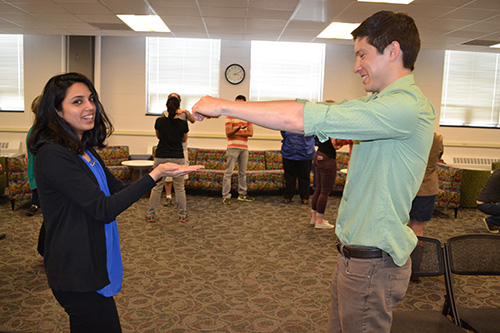
Participants complete a folding-an-imaginary-sheet activity, which was designed to teach participants to pay attention to the other person.
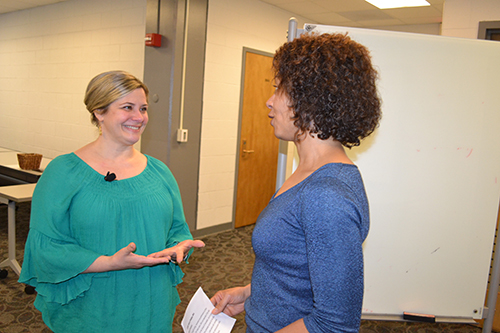
Lydia Franco-Hodges from the Alda Center and I-MRSEC PI Nadya Mason chat prior to the workshop.
What might fun, team-building exercises such as folding an imaginary bed sheet or carrying an imaginary plate glass window have to do with communicating? How about explaining one’s research to a colleague who’s pretending to be an eleven-year-old? In keeping with one of its chief goals—improving science communication—the Illinois Materials Research Science and Engineering Center (I-MRSEC)) held “Making the Choice to Connect,” an all-day workshop on Friday, May 18th. Presented by Lydia Franco-Hodges from the Alan Alda Center for Communicating Science at Stony Brook University, the workshop sought to improve participants’ communication skills by training them to practice relating to others.
Comprised of two sessions, the workshop’s morning plenary session was open to anyone on campus, while the closed, afternoon session was for around 30 MRSEC-only researchers. During the many different exercises the workshop participants took part in, it was common to see the I-MRSEC PI and researchers, mostly full professors, rubbing shoulders with I-MRSEC postdocs and Ph.D. students as they all explored uncharted territory while participating in a number of somewhat unorthodox exercises designed to help them improve the way they communicate about their work.
One might ask, "Is this the same Alan Alda who played a rather irreverent surgeon on the television series M.A.S.H.?" It is. But Alda is also known for a more scientifically relevant piece of work, a PBS television show entitled, Scientific American Frontiers. During the show, Alda used empathy, clarity, and vivid storytelling to interview hundreds of scientists, bringing their work to life. Thus, the Alda Center, begun in 2009, was based on this second body of Alda’s work, and adopted training methodologies inspired by his engaging communication techniques as he sought to bring scientific communication down to the level a general audience could understand—even an eleven-year-old.
For example, one of the workshop activities was to communicate one’s research to a partner who was emulating an eleven-year-old...with an eleven-year-old’s set of concerns. In an aside, lest one assume youngsters of this age group only care about friends, phones, and video games, surprisingly, a video of an interview with a group of youngsters of this age group showed some unexpected results. Besides the above interests, these fifth graders also expressed some rather selfless, more global concerns, such as the environment and sustainability, to mention a few.
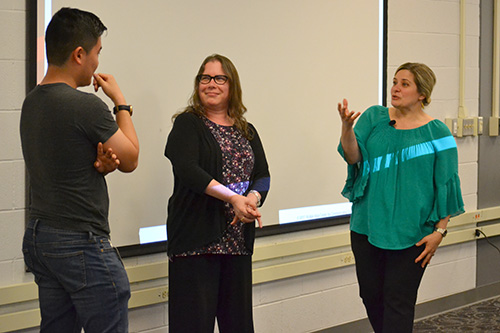
Participants complete the 11-year-old activity. Professor Catherine Murphy (center), played the 11-year-old.
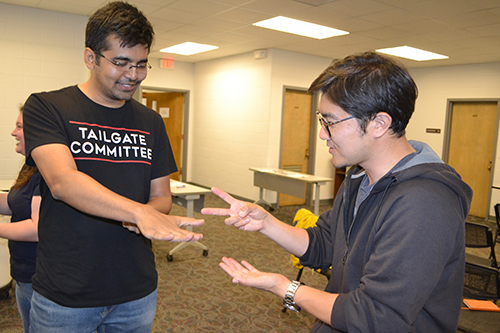
Above: Mohammad Hossain and Jangyup Son, both members of Arend van der Zande's research group, participate in the Rock, Paper, Scissors activity.
Below: Hossain celebrates being the biggest loser...rather winner.
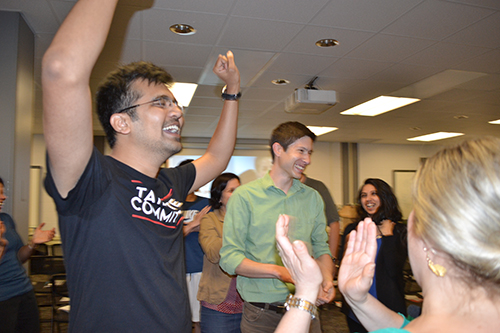
The main idea during this exercise was to make a list the main ideas comprised in one’s research, ostensibly mostly jargon, and then to communicate those to one’s “eleven-year-old” partner without using any of the jargon.
One activity consisted of having the folks toss an imaginary ball around. Meant to foster contacting with one's audience, the idea was that before tossing the "ball," the person throwing it was to make eye contact with the person who was going to catch it. Franco-Hodges also had them practice throwing the ball while expressing different emotions. For example, participants were to be angry or apologetic.
In another activity, participants played an old standard—Rock, Paper, Scissors. (You know, the game kids play to see who gets stuck with taking out the garbage for mom.) However, this version had a new twist; it was designed to encourage team-building by affirming the loser. So the audience divided up into pairs and played the first round. But instead of gloating when they'd won, the winner was to affirm the loser. And instead of the winner moving on, the losers moved on to play in the next round until the only person left was the biggest loser, except he'd actually won, and was loudly celebrated by the entire group.
Since the workshop was about improving scientific communication, one activity fostered coming up with creative titles. So during this exercise, researchers were to create a title describing their research, then reword it in a completely different style, such as an action movie title, or the title of a country song. One such offering that got a good laugh? “My Baby Thinks My Lasers Are Sexy!”
Another very apropos exercise had a team of 7 or 8 participants standing shoulder to shoulder. Then, in response to a suggested topic, they were to come up with a sentence, with each person submitting one word which fit in context with those spoken by all the people before them. (When one member of the team encountered a mind block, one could always resort to “and” or “the” which always got a laugh—and turned out to be quite popular words!)
One of I-MRSEC’s goals, according to PI and Physics Professor Nadya Mason, is to “Create something of a cohort of people who are effective at different levels of communication.” While she and her colleagues are still putting together their program, grappling with, “How do we want to do this? What is the most effective way of using our resources, our time? What are our goals for the year, for the six years?’” she shares that holding an Alan Alda Workshop had always been number one on her list.
Visiting from the Alda Center to head up the workshop was Lydia Franco-Hodges, whose training was actually in theater. She admits that she was first introduced to “scientific improvisation,” as she terms it, on joining the Center several years ago. She shares her goal in the workshop:
“My real interest, and I think Alan shares this, is getting people to be really present with one another, and to really relate to another person, and to really work on the skills of listening and bringing yourself to the conversation. And that seems so simple, but it can make a profound difference when you’re communicating and you feel comfortable enough to be able to do that. And the truth is, most of the time, we are going to feel nervous, and we are going to be maybe putting ourselves at risk, but without the ability to connect with your listener, it can fall flat.”
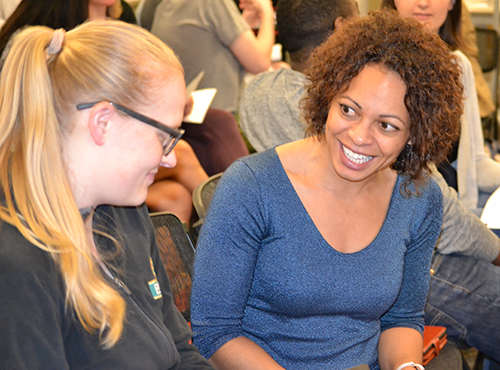
I-MRSEC PI Nadya Mason (right) interacts with MATSE PhD student Blanka Janicek during an activity.
What brought many of the participants to the workshop? A number admitted that they don’t feel particularly skillful at communicating to folks outside of their discipline.
For instance, Chris Montgomery, a PhD student in the Material Science and Engineering (MatSE), shares why he attended: “I'm interested in learning how to communicate my work to a broader audience. Generally I only talk to and present to people that I work very closely with, or are in the same field,” he acknowledges.
Similarly, Mechanical Science and Engineering postdoc researcher Jangyup Son, who works in Arend van der Zande’s lab studying 2D materials’ heterostructures and their applications using multiple stacking and functionalization, admits, “I want to get some training so that I can present my scientific topics to a general audience. I don't have any skills for that, so today would be very useful for my skillset.”
On the other hand, Preetha Sarkar, a first-year Physics PhD student in Nadya Mason's group hopes to change the somewhat negative perception the general public has of scientists.
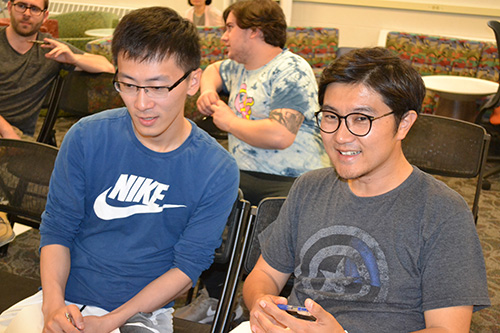
Jangyup Son (right) at the I-MRSEC's Alda Scientific Communication Workshop.
She indicates that she’s always been interested in communicating what she does more effectively. Plus, because she believes scientists are often alienated and considered to be intimidating, Sarkar thinks more effective communication is necessary. “I think there is no reason to think of science or scientists in that way,” she continues, “so I think it's necessary that we learn to communicate what we do more effectively, so people understand that it is like everything else. This is important because it changes society's perception of science, and I think that is necessary, so I want to learn more about this.”
MatSE PhD student Kaitlin Tyler shares why she got involved with the workshop: “Because I am interested in trying to convey science in the easiest way possible so the most people can understand it, so this is important for me to come learn.”
Tyler didn't come with a specific area she hoped to learn more about, “just learning more about different ways to communicate science. So I'm just trying to gather as much information as possible.”
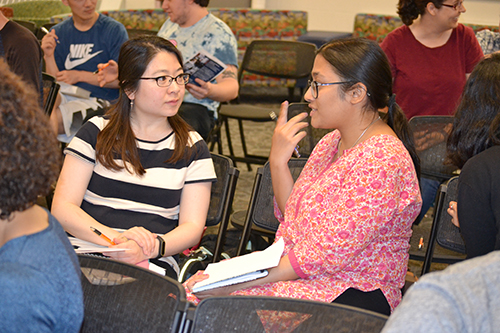
Preetha Sarkar (right) discusses her research with Ella Pek at the I-MRSEC's Alda Scientific Communication Workshop.
Regarding what she learned, Tyler says, “How important an audience is,” then goes on to explain what she gleaned about how to connect to a group you're talking to:
“Understanding why they've come to listen to you speak, and what they’re hoping to get out of it, and using that to build the connection between them as to why they should listen and care about what you're saying.”
Gabriel Burks, a postdoc in Bioengineering, explains that he went to the workshop “As an opportunity to improve or see if I could learn some new ways to communicate. Communicating is a common thing in my field, and we have to do it a lot, and have many different arenas where we have to communicate, so getting as many different perspectives on communication as possible is helpful and helping to formulate how I want to communicate myself.”
Like Tyler, Burks also hoped to go deeper in terms of relating to his audience.
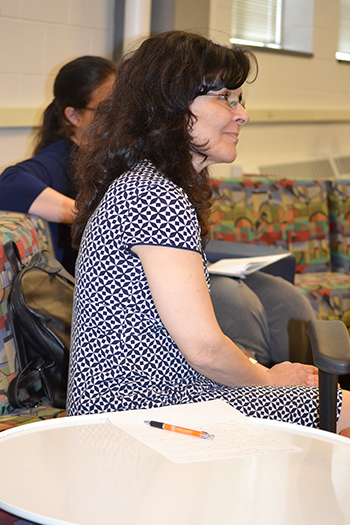
CEE Researcher, Sotiria Koloutsou-Vakakis.
“We always know to think about your audience, ‘Who is your audience?’ But I don't think it's as natural to say, ‘What is your audience feeling? What is your audience relating to?’ So I learned you can attach feeling and emotional connections to sometimes very abstract or technical information to come out with something that is much more relatable to the general audience.”
How does he intend to apply what he learned during the workshop to what he’s doing right now? “I have a couple talks coming up, and it'll make me look at my work from a different lens,” he explains. “What is my message, and what is the goal of my message, and how can I emotionally tie that to the audience?”
His next talk, which is about a month away, is the commencement address for Drexel University College of Engineering.
“Which is a big deal,” he admits, “so I needed to be here.”
In light of what he’d practiced during the workshop regarding a catchy title for his address, had he come up with something snappy? Burks' rejoinder? “I just need to not get booed!”
So in real life, is Alda anything like the character he played in M.A.S.H.? Franco-Hodges, who has worked with him extensively, claims: “He is definitely a presence at the Center. Alan is the real deal. Amazing vision and a profound mission. He cares about science. He cares about society. He cares about the planet. He’s a thoughtful, thoughtful human being.”
Story and photos by Elizabeth Innes, Communications Specialist, I-STEM Education Initiative.
More I-STEM articles about I-MRSEC.
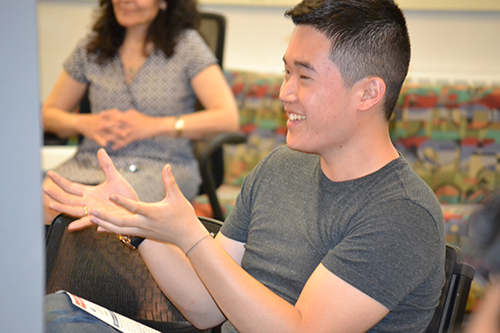
A participant catches an Imaginary ball activity during the Alda Communication workshop.
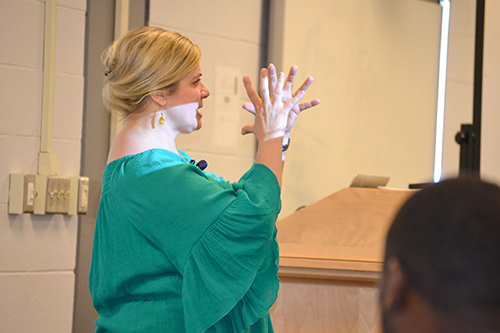
Lydia Franco-Hodges speaks to participants at I-MRSEC's Alda Scientific Communication Workshop.
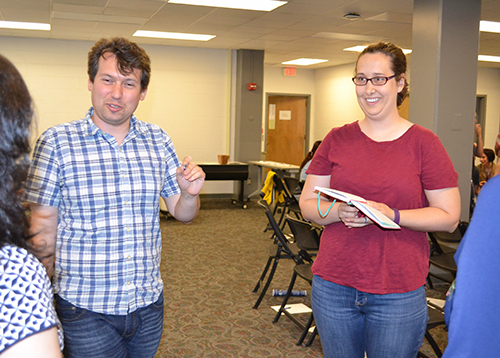
MechSE Professor Arend van der Zande and MatSE PhD student Kaitlin Tyler do an activity with two other workshop participants.
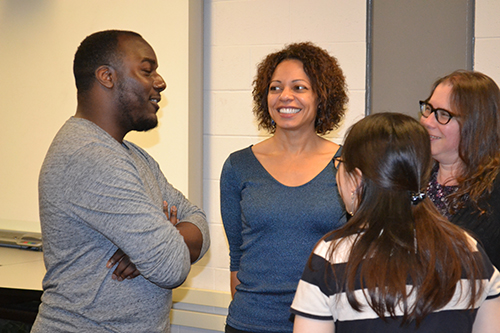
Gabriel Burks (left) does an activity with Nadya Mason, Ella Pek, and Catherine Murphy.
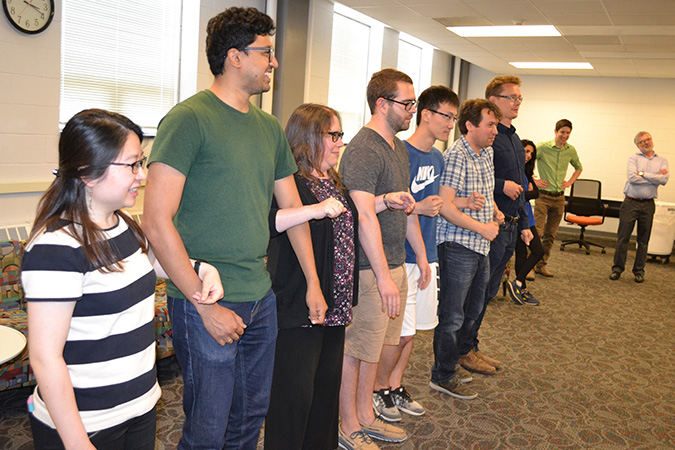
Participants complete the Finish-the-Sentence activity at the I-MRSEC's Alda Scientific Communication Workshop.













.jpg)
















